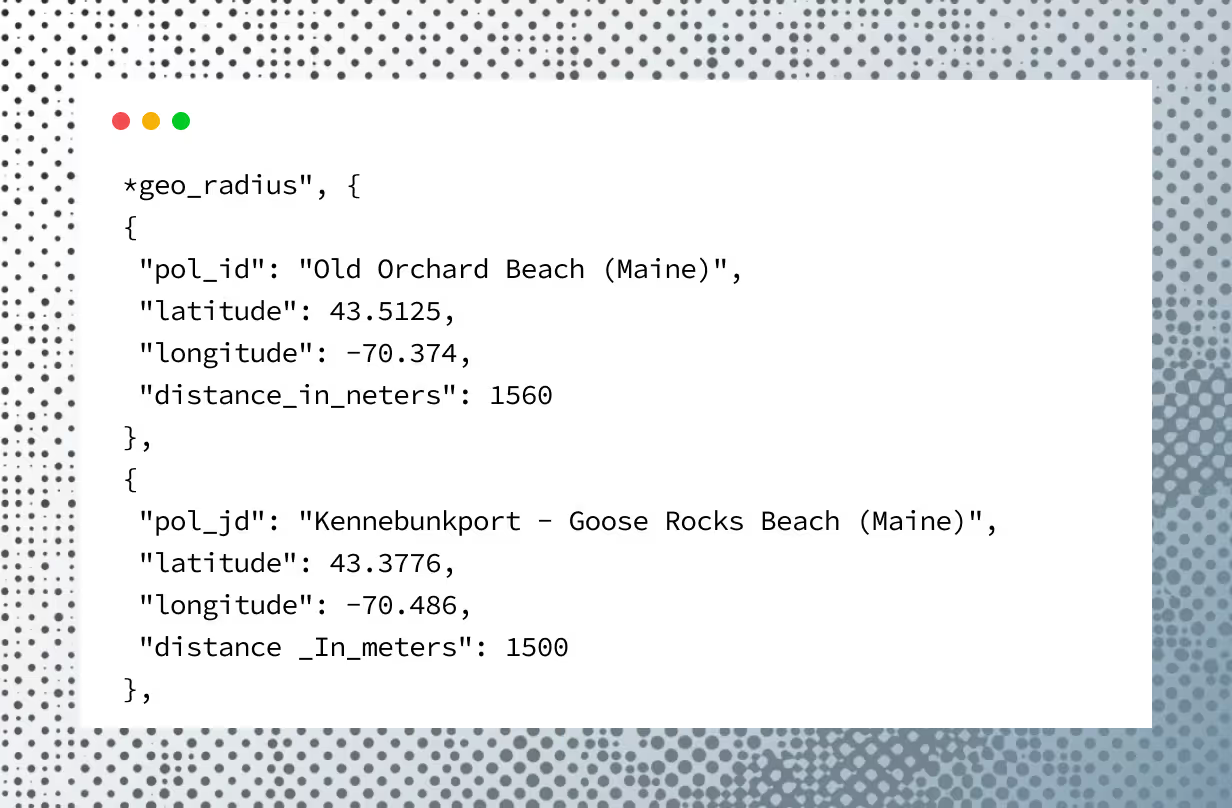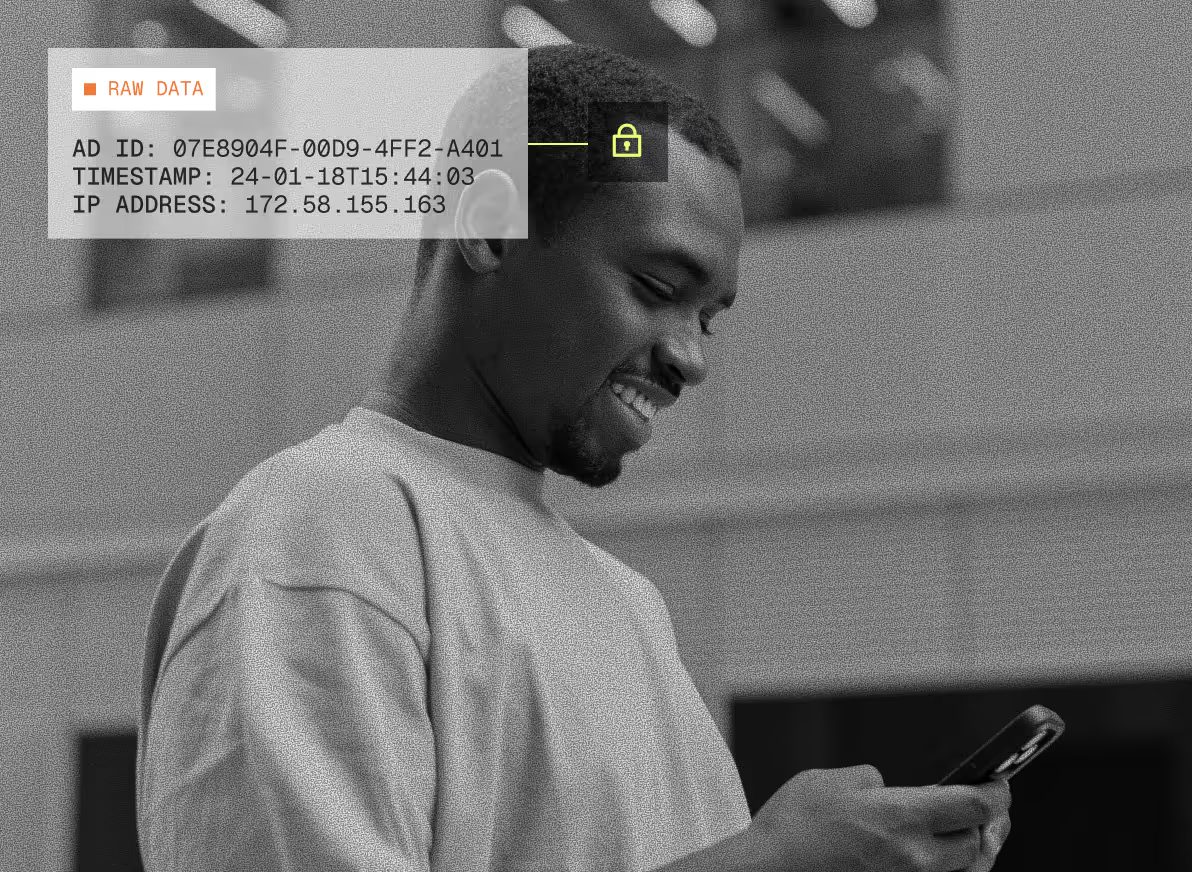Build Smarter Cities with Real-World Movement Data
Transform mobility patterns into actionable insights for infrastructure planning, transit optimization, and community development.

Trusted by Leaders in Adtech,
Enterprise, GIS, and Research



Data-Driven Planning for Modern Cities
Make informed decisions about infrastructure, transit, and development with comprehensive mobility intelligence.

Understand real movement patterns across all modes—pedestrian, vehicle, and transit. Identify bottlenecks, optimize signal timing, and validate transportation models with ground truth data from 300M+ devices.
Measure how infrastructure changes affect different neighborhoods. Track accessibility to essential services, monitor gentrification patterns, and ensure equitable development with demographic-enriched movement data.
upport planning decisions with objective mobility metrics. From zoning changes to transit expansions, use historical patterns and real-time data to model impacts and build community consensus.

We protect consumer privacy while delivering the insights you need
Every device ID is pseudonymized. Every data point is consent-based. Every delivery is encrypted. We handle privacy so you can focus on performance. Our compliance team stays ahead of regulations globally, ensuring your campaigns remain effective and ethical.

Learn. Explore. Innovate.
Get the latest insights, product updates, and technical documentation.

See how Veraset ensures top-tier data security and privacy through encryption and partner protection.
In an era where data breaches and privacy concerns dominate headlines, safeguarding sensitive information has never been more critical.
At Veraset, we take data security, privacy, and partner protection seriously. Recent high-profile breaches in the industry have underscored the importance of robust security measures.
In the article below, we outline the key protocols we’ve implemented to ensure the highest standards of data protection and maintain the trust of our clients and partners.
Minimizing Risk
At Veraset, we’ve built our systems with security as a top priority. Here’s how we protect our infrastructure and operations:
- No Marketplaces: Unlike some data providers, Veraset does not distribute data through third-party marketplaces. This ensures that data is only accessible directly through our secure systems, minimizing the risk of unauthorized access or exposure.
- Server-to-Server Connections: All data delivery is conducted exclusively through server-to-server connections. This means data is pushed directly from our environment to our clients’ environments, eliminating any public exposure or intermediaries in the exchange. All data transfers utilize up-to-date, secure protocols and that systems are regularly audited for potential vulnerabilities.
- Role-Based Access Control (RBAC): Access to sensitive systems, such as AWS, is provisioned through Okta. This allows us to grant specific roles to users, ensuring that only authorized personnel can access the resources they need. With fine-grained control over permissions, we maintain a secure and efficient workflow.
Protecting Our Data
We go above and beyond to ensure that the data we handle is protected at every stage of its lifecycle. Here’s how we do it:
- Veraset Anonymous Identifiers (VAIDR): Our pipeline uses pseudonymized identifiers that cannot be reverse-engineered. This means that even if someone were to access a VAIDIR, they wouldn’t be able to trace it back to an individual.
- Data Segregation: Personally identifiable information (PII) is stored separately from other data types, such as location, demographic, and device data. These datasets are only brought together at the point of delivery, reducing the risk of exposure.
- Encryption and Regular Testing: All data is encrypted during transit, and we conduct penetration testing every six to twelve months to identify and address potential vulnerabilities. These proactive measures ensure that our systems remain secure against evolving threats.
- Code Reviews: Any data provisioning requires a code review and approval by a second developer. This two-step process prevents unauthorized access and ensures accountability.
Protecting Our Partners: Safeguarding Identities and Access
We understand that our partners rely on us to protect their interests as well. Here’s how we ensure their security:
- Supplier Anonymization: Suppliers are identified by unique codes rather than names, protecting their identities from exposure and maintaining their anonymity.
- Controlled Access: When we expose a data bucket to a partner, access is provisioned to a specific user within their organization. This minimizes the risk of exposure, as a breach would require compromising that user’s credentials.
- Use Case Vetting: Before proceeding with data evaluation, all prospects must state their intended use case, which is reviewed and approved by our team. This ensures that data is only used for legitimate and authorized purposes.
Key Takeaways for Clients
When you partner with Veraset, you can trust that your data is in safe hands. In sum, what sets us apart is:
- Direct and Secure Data Delivery: Our server-to-server connections ensure minimal exposure risk.
- Advanced Data Protection: Sensitive data is pseudonymized, segregated, and encrypted for maximum security.
- Partner Safeguards: We protect the identities of our partners and suppliers through anonymization and controlled access.
- Proactive Security Measures: Regular testing and robust access controls prevent unauthorized data access.
We’re committed to maintaining the highest standards of data security and privacy. By implementing these measures, we not only protect our data but also uphold the trust and confidence of our clients and partners.
---
Stay secure. Stay confident. Partner with Veraset.
For more information about our data security practices, contact us today.

The FTC is intensifying its oversight of sensitive location data, enforcing stricter transparency, consent, and privacy standards across the data ecosystem.
The Federal Trade Commission (FTC) has recently intensified its focus on the protection of sensitive location data, marking a significant shift in its regulatory approach. This heightened scrutiny is evident through a series of enforcement actions against data brokers and companies involved in the collection, processing, and sale of location data. These actions underscore the FTC's commitment to safeguarding consumer privacy and ensuring that companies adhere to transparent and ethical data practices.
X-Mode Social and Outlogic
On January 9, 2024, the FTC issued its first-ever prohibition on the use, sale, and disclosure of sensitive location data against X-Mode Social and Outlogic (collectively referred to as "X-Mode"). This landmark action was driven by allegations that X-Mode engaged in unfair and deceptive practices by misrepresenting the use of location data and failing to obtain proper consumer consent. The FTC's complaint highlighted several critical issues:
- Inadequate Disclosure of Use and Purpose: X-Mode's privacy disclosures were found to be insufficient, failing to inform consumers about the full extent of data usage, including the sale of location data to government entities. This lack of transparency prevented consumers from making informed decisions about their data.
- Inadequate Protections for Sensitive Data: Until May 2023, X-Mode did not restrict the collection of location data from sensitive locations such as healthcare facilities, churches, and schools. The company lacked policies to remove sensitive locations from raw data before selling it, raising significant privacy concerns.
- Failure to Honor Consumer Privacy Choices: X-Mode was criticized for not respecting consumer privacy preferences, particularly in cases where users had opted out of data collection.
The FTC's order against X-Mode mandated the implementation of an SDK Supplier Assessment Program to ensure that third-party apps using X-Mode's software development kits (SDKs) obtained proper consumer consent and adhered to privacy standards.
InMarket Media
Shortly after the action against X-Mode, the FTC announced a similar enforcement action against InMarket Media on January 18, 2024. The case against InMarket emphasized the need for transparency, proper notice, and consumer consent regarding the processing of sensitive location data. Key issues identified in the complaint included:
- Lack of Consumer Notification: InMarket failed to notify consumers that their location data was being used for targeted advertising. The consent screens within apps only mentioned that location data would be used for app functionality, omitting details about precise location tracking and its commercial use.
- Excessive Data Retention: InMarket's five-year retention period for location data was deemed excessively long, increasing the risk of data misuse or re-identification.
The FTC's order against InMarket prohibited the company from sharing, selling, or transferring sensitive location data without explicit consumer consent.
Broader Implications and Industry Impact
The FTC's recent actions against X-Mode and InMarket are part of a broader effort to address the growing concerns over the use of personal data in advertising and other commercial activities. These cases highlight several critical themes that are likely to shape future regulatory actions:
- Transparency and Consumer Consent. One of the central issues in both the X-Mode and InMarket cases was the lack of transparency and inadequate consumer consent. The FTC has made it clear that companies must provide clear and conspicuous privacy disclosures that accurately describe how consumer data will be used. Vaguely worded consent forms or disclosures that omit critical information are insufficient and can lead to enforcement actions.
- Protection of Sensitive Data. The FTC has emphasized that certain types of data, such as location data, are inherently sensitive and require robust protections. This sensitivity is due to the potential for such data to reveal intimate details about a person's life, such as visits to medical facilities, places of worship, or other sensitive locations. The FTC's actions signal that the sale or misuse of such data without proper safeguards is unacceptable.
- Data Minimization and Retention Policies. The FTC has also focused on the principles of data minimization and appropriate data retention periods. Companies are encouraged to collect only the data necessary for their operations and to retain it for the shortest time possible. Long retention periods increase the risk of data breaches and misuse, and the FTC is likely to scrutinize such practices closely.
- Future Directions and Regulatory Trends. The FTC's recent enforcement actions are indicative of a broader regulatory trend towards stricter oversight of data practices. Several key themes and potential future directions can be identified:
- Increased Enforcement and Penalties. The FTC has signaled its intention to continue aggressive enforcement actions against companies that violate consumer privacy. This includes not only fines and penalties but also more stringent measures such as outright bans on certain data practices, as seen in the cases against X-Mode and InMarket.
- Focus on Upstream Liability. FTC Chair Lina Khan has emphasized the importance of addressing upstream liability, targeting not just the consumer-facing applications but also the backend infrastructure that facilitates data collection and processing. This approach aims to hold all actors in the data ecosystem accountable for their roles in enabling unlawful conduct.
- Algorithmic Disgorgement. The FTC has increasingly used the tool of algorithmic disgorgement, requiring companies to delete not only unlawfully obtained data but also the data products created from such data. This measure aims to address the incentives that drive harmful data practices and ensure that companies do not benefit from their unlawful actions.
- Comprehensive Privacy Legislation. There is growing support within the FTC for comprehensive privacy legislation that would provide baseline protections for all consumers. Such legislation could help address the challenges posed by new technologies and business models that rely on extensive data collection.
Summing up
The FTC's recent enforcement actions against X-Mode Social, Outlogic, and InMarket Media represent a significant step towards stronger protection of sensitive location data. These actions highlight the importance of transparency, consumer consent, and robust data protection measures.
As the data economy continues to evolve, the FTC's regulatory approach is likely to become increasingly critical in ensuring that consumer privacy is respected and protected. Companies operating in this space must heed the lessons from these enforcement actions and adopt best practices to avoid similar scrutiny in the future.

Discover what location data is, how it’s used across industries, and how Veraset ensures it’s handled responsibly and with respect for privacy.
What is location data?
Location data, also known as human mobility data, refers to the information gathered from devices such as smartphones, GPS devices, and Internet of Things (IoT) sensors that can track the geographical location of individuals or objects. This data provides insights into the movement patterns, behaviors, and preferences of individuals in various contexts.
What are use cases of location data?
Different industries leverage mobility data to improve decision making and produce insights.
Real Estate
Location data plays a crucial role in the real estate industry. By analyzing the movement patterns and preferences of individuals, real estate professionals can gain insights into market trends, demand for specific locations, and property values. This information helps them make informed decisions regarding property investments and development projects, ultimately benefiting both buyers and sellers.
Retail
In the retail sector, location data enables businesses to better understand consumer behavior and tailor their marketing strategies accordingly. By analyzing the places individuals visit and the routes they take, retailers can optimize store locations, personalize advertisements, and create targeted promotions. This leads to improved customer experiences and increased sales.
Academic Research
Location data has immense potential for academic research. By examining human mobility patterns, researchers can gain insights into various aspects of society, such as migration patterns and trends, transportation systems, urban planning, and the spread of diseases. This data can contribute to evidence-based decision-making and the development of more efficient and sustainable solutions.
Finance
Location data can also benefit the finance industry. By analyzing the movement patterns and spending behaviors of individuals, financial institutions can enhance fraud detection and prevention measures
Traffic flow and transportation systems
Another compelling use case for location data is optimizing traffic flow. With the help of real-time location data, traffic managers can gain valuable insights into the movement patterns of vehicles on the road.
This data enables them to identify congestion hotspots, determine optimal routes, and implement proactive measures to alleviate traffic congestion. By making data-driven decisions, traffic flow can be streamlined, reducing travel time and enhancing the overall driving experience for commuters.
Location data and intelligence are essential for assessing the demand and usage of both private and public transport systems. By analyzing location data, transportation authorities can identify areas with high demand for public transportation and allocate resources accordingly. This helps in optimizing routes, adjusting schedules, and improving the accessibility and efficiency of public transportation services.
Ultimately, this leads to enhanced commuter experiences, increased ridership, and reduced congestion on the roads.
Advertising
Location data has become invaluable in the world of advertising. Leveraging this data, companies can better understand and target their audiences, leading to more effective marketing campaigns.
One of the most compelling use cases of location data in the advertising industry is targeted advertising. By analyzing location data, marketers can gain insights into consumer behavior and preferences. They can identify where their target audience spends their time and tailor their advertising campaigns accordingly.
For example, a retailer can use location data to display targeted ads to customers when they are near their stores, increasing the chances of attracting them to visit and make a purchase.
Another exciting use case is location-based promotions. With location data, advertisers can create promotions that are specific to certain geographic areas.
For instance, a restaurant chain can send mobile coupons to customers who are in close proximity to their locations, enticing them to come in for a meal. This personalized approach can significantly improve the effectiveness of promotions, as it targets consumers at the right time and place.
Location data also plays a crucial role in measuring the effectiveness of advertising campaigns. Marketers can use this data to gauge the impact of location-targeted campaigns by analyzing footfall and conversion rates in different areas. By understanding which locations perform well and which ones don’t, advertisers can better tailor their message.
How is privacy protected in location data?
As location data becomes increasingly integral to various industries, ensuring the privacy and security of such data is paramount. Here are some recent updates in privacy measures concerning location data:
Consent
- Implementation of stricter consent mechanisms where users have to explicitly agree to share their location data, often through granular consent forms.
- Introduction of just-in-time notices that inform users exactly when the location data is being collected and for what purpose.
- Mandating periodic re-consent, where users are asked to renew their consent to share location data at regular intervals.
Anonymization
- Adoption of advanced anonymization techniques such as differential privacy, which adds noise to datasets to prevent identification of individual records.
- Implementing stricter controls on the storage and sharing of raw location data to minimize the risk of re-identification.
- Usage of pseudonymization to replace identifying fields within data records with artificial identifiers or pseudonyms.
Aggregation
- Increased use of data aggregation, where location data is combined into groups or sets that are large enough to prevent the identification of individuals.
- Setting minimum group sizes for aggregated data to ensure individual data points cannot be isolated.
- Combining location data with other types of data in a way that it cannot be used to identify individual patterns or behaviors.
Safeguarding
- Employing encryption both for data in transit and data at rest to ensure that location data remains secure.
- Regular auditing and monitoring of access to location data to detect and prevent unauthorized access.
- Implementation of data minimization principles, ensuring that only the data that is absolutely necessary is collected.
Opt-out
- Facilitating easier mechanisms for users to opt-out of location data collection, such as intuitive toggles within app settings.
- Providing users with the ability to not only opt-out of current data collection but also to request the deletion of historical location data.
- Increasing transparency by informing users of the implications of opting out and how it might affect their experience with the service.
As the applications of location data continue to expand, it becomes essential to find a balance between leveraging this data for its immense utility and protecting the privacy of individuals. Recent advancements in privacy-preserving techniques such as anonymization and aggregation, coupled with regulatory changes emphasizing consent and opt-out options, have paved the way for a more responsible handling of location data.
Through collective efforts, location data can continue to contribute positively to various sectors while respecting the fundamental human right to privacy.

What Our Partners Say
Hear from organizations building with Veraset data.
“Partnering with Veraset has elevated our ability to deliver highly effective, data-driven campaigns. They’re not just a data provider, they’re a strategic partner that has helped us deliver better outcomes for our clients.”

Put Our Data to the Test
Request a demo or start an evaluation today.





